Most of us who grow vegetables at home are interested in feeding ourselves and our families with nutritious vegetables that are free of harmful chemicals. Avoiding using chemicals for pest and disease control can be challenging. However, you can use organic vegetable gardening techniques to overcome these challenges. One of these techniques is companion planting.
Companion planting is the concept of growing a target plant with one or more companion plants if the target plant will perform better when grown close to its companions than if it was grown separately. Companion planting can prevent many common vegetable gardening problems, such as pests and diseases. This results in plants that produce a larger number of good quality vegetables and allows for vegetable garden space to be maximized.
Although vegetable plants can act as companions to other vegetable plants, the benefits of adding flowers and herbs to your vegetable garden must not be underestimated. Most companion plant pairings are based on ancient wisdom and modern gardening experience. The accuracy of some of these combinations has been scientifically proven.
Companion planting for pest control
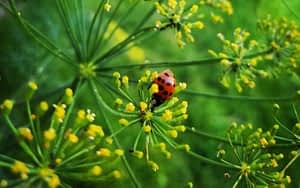
One of the biggest organic gardening challenges is getting rid of pests and diseases. Prevention is always easier and better than cure. Planting vegetables together with other plants is a pest control strategy that is easy to implement. Some companion plants control pests by attracting beneficial insects that prey on pests into the garden, while others simply deter pests from their companion plants.
Herbs, including mint, rosemary, and thyme, have been found to deter pests away from vegetable plants. Planting basil with tomatoes and peppers can not only protect these plants from a range of pests, including tomato hornworms and thrips but may also increase their flavor. Plants in the onion family can also deter pests and are suitable companions for almost all vegetable plants.
Plants, such as dill, fennel, oregano, mint, and sunflower, act as breeding grounds for the larvae of ladybird beetles, lacewings, wasps, and other predatory insects. In turn, these predators feed on aphids, thrips, mites, and other plant pests and prevent the development of infestations.
Companion planting for attracting pollinators
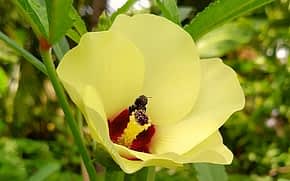
A lack of pollination can drastically reduce the yield of a vegetable garden. Adding plants that attract pollinators is one way of promoting the growth of vegetables. The flowers of vegetable plants, such as pumpkin and other gourds, okra, and tomatoes themselves, can attract pollinators. Most herb plants will also attract pollinators while they are flowering.
Flowers such as sunflowers, daisies, and butterfly bush can also be grown in and around vegetable gardens. Although it may seem like a waste of valuable space, the increase in productivity can make up for the loss of space. You can plant sunflowers to provide shade and shelter for plants and support vegetable plants, such as beans and cucumbers.
Companion planting to maximize vegetable garden space
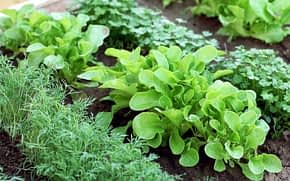
Vegetable garden space can be limited in urban areas. Companion planting can help you save valuable garden space by allowing you to grow plants as close together as possible without adversely affecting plant growth or yields.
Plants with different root depths are usually ideal companions because they will not need to compete for nutrients or water. For example, green pepper plants have shallow wide-spread roots, and spinach, which has deep roots, can be planted in the space between green pepper plants. This combination not only saves space, but the green pepper plant can also shield the spinach from wind and frost.
Some plants that have a similar depth of roots may also work together. An example is planting tomato, eggplant, or green pepper plants close to garlic chives. Although all these plants have deep roots, the garlic chive roots secrete compounds that suppress the growth of disease-causing soil bacteria, protecting the tomato, eggplant, or green pepper plant from soil-borne diseases, while the compounds released by its leaves act as a pest repellent.
Companion planting for building healthy soil
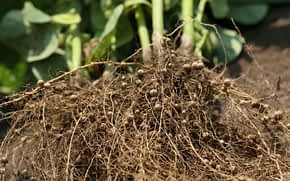
Legumes (bean family) can add nitrogen to the soil because they contain nitrogen-fixing bacteria in their root nodules. Beans can be grown with many other vegetables to enrich the soil. A classic example of this is growing pole beans with corn, which is an intensive nitrogen feeder. The beans provide the corn with additional nitrogen, while the corn provides support for the beans to grow on and shelters it.
Vegetable plants such as squash and pumpkin that spread over the ground can be used as living mulch to protect the soil around other plants from water loss at high temperatures and limit the loss of soil nutrients.
Companion planting to provide shelter and shade
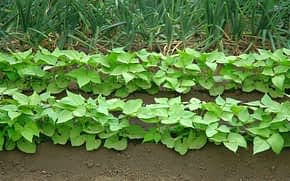
Companion planting can also be used to create shade for plants that need it. For example, ginger, which grows best in the shade, can be grown between eggplant after the plants have grown to a certain height. Eggplants can also scavenge for water and nutrients using their deep roots, making it easier for ginger, which has shallow roots, to obtain the same. In return, the disease-preventing compounds secreted by ginger plants will protect the eggplants from soil-borne diseases.
However, companion planting can inadvertently create shaded areas for plants that do not grow well in the shade. To avoid this, you should always plan your garden with the future growth of plants in mind because not all plants grow at the same rate or reach similar heights. Shorter plants that require full-sun can be planted towards the edge of a vegetable patch.
Vegetable plants to avoid planting together
Although there are multiple combinations of plants that can be planted together, there are also plants that you should not grow together. Examples of plant pairings that should be avoided are given below.
- Fennel is a plant that should not be grown near most other vegetables or herbs as it seems to inhibit the growth of other plants growing near it.
- Garlic and onions should not be planted together with beans and peas, as they may suppress each other’s growth.
- Corn and tomatoes should not be planted together as they are affected by the same pests, including the tomato hornworm.

Companion planting is an ideal concept to implement in your organic vegetable garden. Designing your vegetable garden using companion plant pairings will enable you to increase yields and make garden care and maintenance a lot easier.
Although you can use many of the common companion plant pairings listed here or elsewhere as a guide, the specific ecological conditions in your garden can affect the outcomes of these pairings. Keeping a record of which plants you planted together and how they performed will allow you to evaluate how these pairings work in your own vegetable garden. Then, you can repeat pairings that did work and continue to experiment with other plant pairings.


I enjoy gardening, but I haven’t heard of companion gardening. I ll keep these points in mind in future. Thanks 😊
Very interesting post! My daughter is just planning what we are going to plant this year and the information in your post is very helpful. We don’t use any chemicals on our veggies we grow so companion gardening is something we need to keep in mind. I guess the natural world are the experts in companion gardening so getting more in tune with what plants have a natural affinity with each other is valuable knowledge. Thanks!
This is fantastic information. I will definitely be revisiting this article. I took some screen shots as well. Thanks for sharing.
I would love to plant green chillies and other vegetables which I regularly use, this has given me more information to make a start. Love this post and I’ve learnt something new!
Thanks for this blog post! My family and I are creating a garden and we are also planting vegetables. This is really helpful 💚
I hadn’t thought of companion planting before but it makes so much sense. I’m excited to start my first garden this spring!
An excellent and appropriate article which can really help those who don’t know these relationships. Keep up the good work because it can help us all.